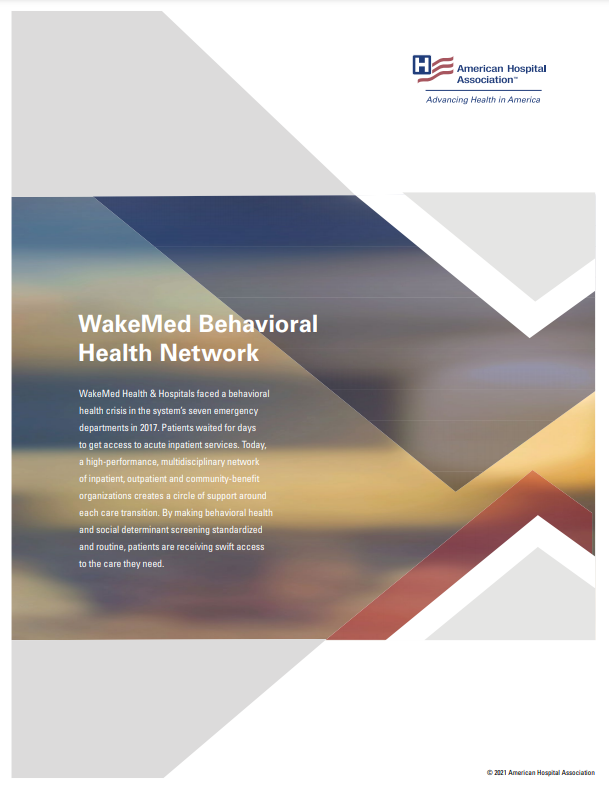Case Study: WakeMed Behavioral Health Network
WakeMed Health & Hospitals faced a behavioral health crisis in the system’s seven emergency departments in 2017. Patients waited for days to get access to acute inpatient services. Today, a high-performance, multidisciplinary network of inpatient, outpatient and community-benefit organizations creates a circle of support around each care transition. By making behavioral health and social determinant screening standardized and routine, patients are receiving swift access to the care they need.
Executive Summary
WakeMed Health & Hospitals faced a behavioral health crisis in the system’s seven emergency departments (EDs) in 2017. The population explosion in its North Carolina service area brought tens of thousands of individuals with complex medical, behavioral and social issues and nowhere to turn. In 2017 alone, the Raleigh-based hospital system logged more than 40,000 encounters in its EDs for substance use and psychiatric disorders. The existing counseling and behavioral therapy services in Wake, Johnston and Durham counties were not integrated. For WakeMed, the solution required collaborating and coordinating among all these disparate organizations to form WakeMed Behavioral Health Network (WMBHN). The goal was to build a high-performance, multidisciplinary network of inpatient, outpatient and community-benefit organizations, creating a circle of support around each care transition.
To be successful, it required the:
- Use of common screening and assessment tools.
- Application of best-practice, patient-engagement techniques and technology.
- Mitigation of social and medical obstacles to treatment compliance.
- Coordination at all levels of 1 2 3 4 follow-up care.
With a broad representation of health care systems, agencies, elected officials, insurance companies, large employers and community service agencies, leaders recognized that they needed to do more, they could do more and they needed to work together to make it happen. When the pandemic hit and access to behavioral health support became more important than ever, this diverse coalition was able to provide services to address the physical health and mental health needs of the community.
WakeMed also implemented a new intake policy that requires behavioral health screening, risk stratifying and treating every patient, regardless of how or where they entered the system. By making behavioral health and social determinant screening standardized and routine, patients are receiving swift access to the care they need.
Within two years of implementation, WMBHN increased the speed to treatment and reduced avoidable hospital days by 52% and improved access to outpatient services, including first-time patient show rates, from 20% to 85%.
During the pandemic, several WMBHN partners offered urgent care services with extended hours to serve adults and children facing a behavioral health or substance use crisis. Utilizing these specialized services freed up emergency departments to focus on caring for patients with COVID-19 and other medical issues. The Duke Endowment’s $1.6 million grant to the WakeMed Foundation made the expansion of virtual behavioral health for children possible as youth of all ages continue to cope with the emotional toll of COVID-19.



